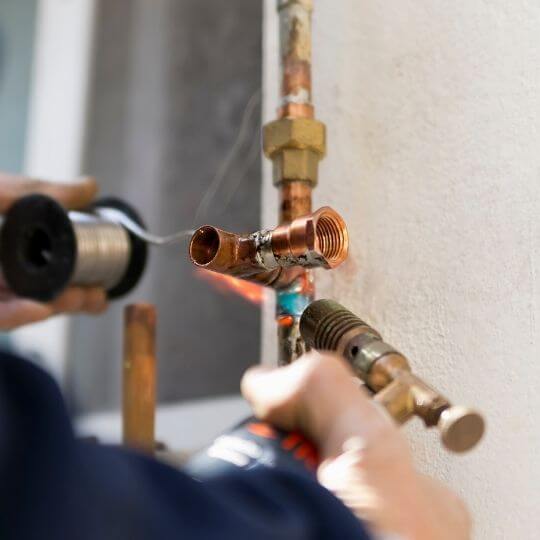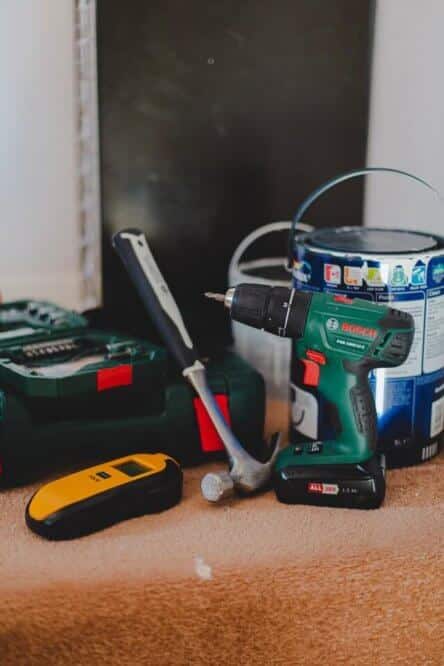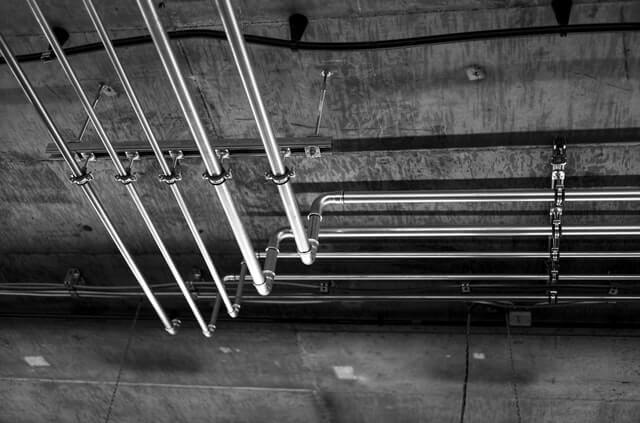Did you notice pinhole leaks in copper pipes that you use for heating?
The benefits of copper piping were always found in its sturdiness and longevity. However, despite it being tough enough to resist corrosion, that doesn’t mean corrosion won’t affect it at all.
What are pinhole leaks?
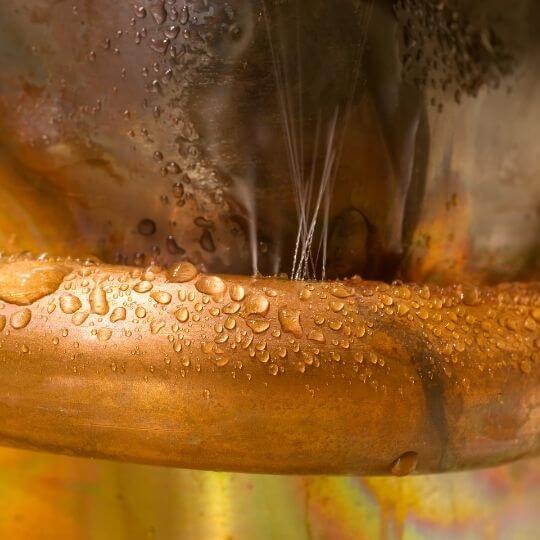
Pinhole leaks are the type of leaks that are unique to copper piping. These leaks manifest themselves as tiny holes that develop over time, causing a multitude of issues for the plumbing they appear on.
The corrosion of a pinhole leak comes from the inside out, which means they will exclusively be caused by the contents of the pipe rather than the environment that the pipe is in. Now, let’s see how these issues crop up and how they can get taken care of.
What causes pinhole leaks in copper pipes?
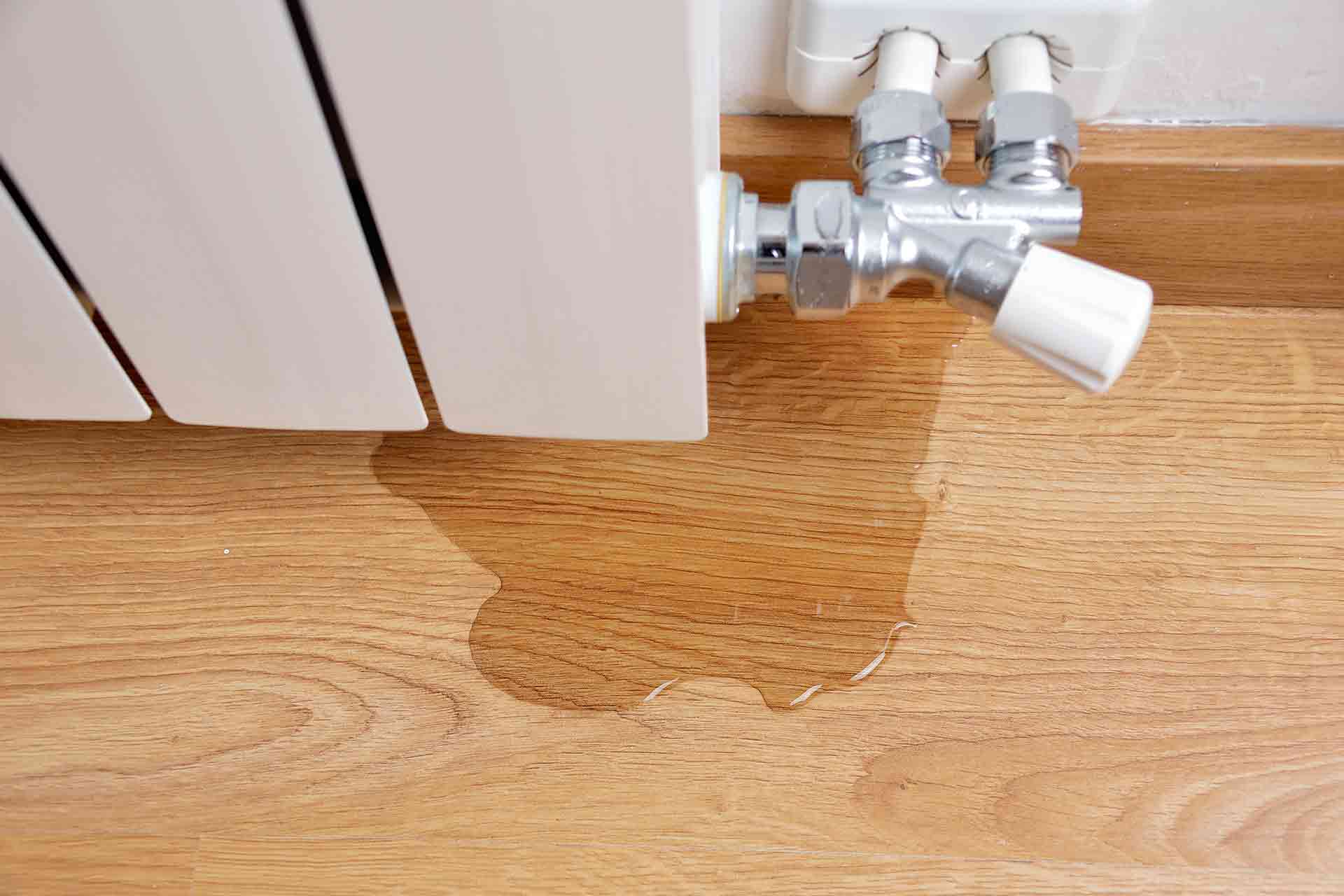
- Corrosion from within
In some cases, corrosive materials are transferred through the pipe itself, as they circulate and travel through the pipe these materials corrode the metal.
This type of corrosion is called pitting, it presents a very real issue for engineers and homeowners across the world and it’s a key source of pinhole leaks in copper pipes. [1]
- Hard Water
The substances in our water that usually contributes to this corrosion are high amounts of calcium or magnesium. Water that has a lot of these substances is called hard water.
As time goes on, these materials carried by water can accumulate on the pipes. The accumulated substance made of calcium and magnesium is called limescale and can clog our pipes as well as corrode them if it sticks around.
- Basic or Acidic pH value
Another trait that could make the water dangerous to our pipes is too high or too low of a pH value. If it goes too low that means our water is too basic in its properties and if it goes too high it becomes acidic. Both of these traits are bad for our copper pipe’s structure.
How to recognize your pipes have pinhole leaks?
The issue of detection is something most people will be troubled by when it comes to pinhole leaks. These pipes are within our walls and cannot be inspected easily. That’s why we have to rely on some other signs of leakage happening.
- Low water pressure
You may notice that your water pressure is lower than usual. Copper pipes leak causes leaking out the pressure as well as water and reducing the flow of water throughout our house. While this may be a temporary change that has nothing to do with our plumbing but the water supply itself, it’s still a sign to be wary of.
- Water damage
In case there’s water damage around your pipes it’s very likely you’ve at least some sort of leak, potentially one of pinhole variety considering the resistance to other types of leakage copper pipes provide. Water damage may occur on lower floors below the pipes too. If you see it crop up you may be dealing with pinhole leaks.
- Discolored pipes
For those who can take a direct look at their pipes, we suggest checking the color of the pipe first. Pinhole leaks in copper pipes affect the coloration of our pipes too. This happens due to the oxidization of the pipes and may result in them getting a more prominent brown, green, or blue coloration.
- Pipes are moist or wet
While inspecting the pipes for color, make sure to feel the pipes themselves. Your pipes should be completely dry on the outside. When they aren’t and you feel hints of moisture on them, there may be leaks on the pipe somewhere which are allowing bits of water to drip through and make the outside of the pipes wet.
In the end, pinhole leaks are very hard to find, at least before the more serious side effects start occurring, so don’t be surprised if it slips by you. The actual pinhole leaks could be almost undetectable to the naked eye. This is why it’s best to prevent the issue if possible.
Related: Signs of Water Damage Under Floor
How to prevent pinhole leaks in copper pipes?
It’s always better to prevent a problem than to deal with it once it happens. This goes double for situations like these where the problem occurring can cascade into multiple other household issues such as water damage.
- Water softeners
The first step in securing your pipes and preventing pinhole leaks is through the elimination of hard water. The way to deal with this is by purchasing a water softener. They will adjust the pH value of the water flowing through our pipes, removing its corroding properties.
The water softeners can also deal with debris and limescale accumulation. They remove calcium, magnesium, and other problematic materials from our water.
- Have a professional inspect your pipes
There is a chance your issues will stem from improper installation. If this is the case, make sure to hire plumbers to commit an inspection on your pipes.
The issues with the pipes can be minor, requiring minor fixes, but they can escalate to a point where replacing the pipes is the only way to prevent future pinhole leaks from occurring.
- Reduce the water velocity
When the water velocity of your pipes is too high, water and debris within it will travel at far greater speeds. When this happens, the plumbing has to endure a whole lot more stress from the constant barrage of high-pressure water.
This’ll likely wear out your pipes, making them more prone to corrosion. It could also speed up the pace at which bad materials accumulate within the pipes themselves.
To avoid having these issues, it’s suggested to keep the water velocity at a normal pace. This could mean contacting the water distribution offices directly and inquiring about the unusually high water pressure. If it’s a permanent velocity rather than a temporarily increased one, ask them to reduce the flow to a point where it won’t cause issues to our pipes.
Although simple, reduced water velocity might be all we needed to keep our pipes healthy. Do not prolong resolving this issue if it does crop up in your household as it enhances the negative effects of other plumbing issues.
Repairing copper pipes
Of course, sometimes we’ll be unable to get ahead of the problems. This requires repairs to be done on our copper pipes and while more prominent issues usually result in simpler repairs, the situation with pinhole leaks is quite different.
Get a repair kit
To engage in actual repairs, we’ll need some DIY equipment. For pinhole repairs and other structural problems your pipe may have we suggest getting a copper pipe leak repair kit. These kits are very easy to use, apply, and can heavily reduce your repair costs. They do not affect the quality of water either, leaving it completely safe for drinking.
Hire a professional plumber to fix it
However, you may need to hire a plumbing professional to fix it up. The amount of money it will cost to repair the pinhole leak in copper pipe will vary depending on the severity of the issue but the usual price is between $150 and $240. [2]
While that’s not an obscene amount, it can still cut into our funds.
Pipe’s age can also affect how hard pitting corrodes it. Not only that, corrosion further reduces its lifespan. In some situations, entire pipes may need to be replaced which will sharply increase costs.

Michael Davis is a heating & plumbing expert who currently works as independent contractor in SC. He also writes for Plumbertip.
For almost 10 years he worked on various plumbing tasks across South Carolina.
